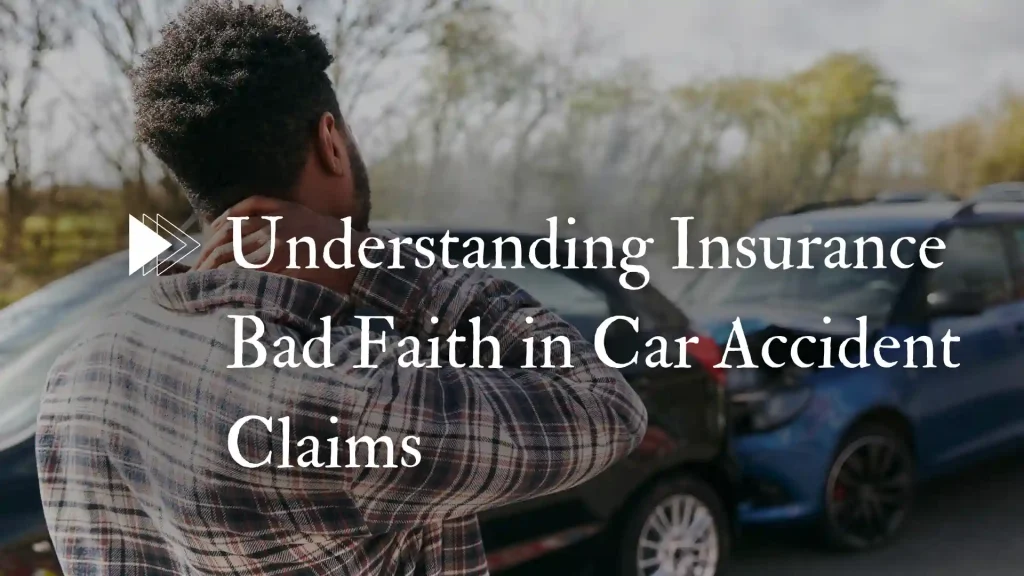 Many people think that if they get into a car accident in Georgia, the at-fault driver’s insurance company will cover their medical expenses, lost wages, and other losses. However, insurance companies are often more interested in protecting their bottom lines than paying accident victims the compensation they deserve.
Many people think that if they get into a car accident in Georgia, the at-fault driver’s insurance company will cover their medical expenses, lost wages, and other losses. However, insurance companies are often more interested in protecting their bottom lines than paying accident victims the compensation they deserve.
Insurance companies sometimes engage in bad faith practices to deny or reduce the value of otherwise reasonable claims. When this happens, it’s essential to understand your rights and the next steps you should take to seek compensation for your injuries.
What Is Insurance Bad Faith?
Insurance bad faith is when an insurance provider engages in dishonest practices to deny claimants the compensation they deserve. This could be through outright claim denials or providing false reasons for why the insurance company will only cover a portion of the claimant’s damages.
While insurance bad faith most often harms the injured party seeking compensation for their medical expenses and other losses, it can also harm the policyholders. If an insurance company denies a valid claim, it could lead to the policyholder being liable for damages through a personal injury lawsuit.
Signs of Bad Faith Practices by Insurance Companies
It’s essential that you be able to recognize the signs of bad faith insurance practices so you can tell whether the insurance company handling your case is trying to take advantage of you. Some of the most common signs of insurance bad faith are unreasonable claim processing delays, denying claims without a valid reason, offering lowball settlements, and unfairly assigning fault.
Unreasonable Claim Processing Delays
Georgia Code Section 33-4-7 states that auto insurance providers must make a reasonable effort to investigate and evaluate all claims and make a good faith effort to settle claims where the claimant is entitled to recover compensation. This statute also grants insurers 60 days to either accept or deny claims.
If the insurer fails to process the claim within this period, the claimant can file a lawsuit against them for bad faith practices. If the insurer makes a payment after the 60-day period, that does not absolve them of wrongdoing.
Sometimes, insurers will delay processing claims they know are valid, hoping the injured party will give up on their claim.
Denying Claims Without a Valid Reason
When an insurance company denies a claim, they must include a reason for the denial in their notice. If the insurance company denies your claim and the reason for the denial doesn’t make sense based on the facts of the case, the company may be engaging in bad faith tactics. The insurer may be hoping that you won’t pay attention to the reason for the denial or that you won’t take the time to file an appeal.
Offering Lowball Settlements
Many insurance companies offer a low first settlement, hoping the claimant will accept it and move on. While this is standard practice, some insurance companies take it further and refuse to offer settlements anywhere close to what your case is worth.
They do this because many claimants don’t know the value of their cases. Without the right knowledge and experience, knowing what your injuries are worth and how to advocate for the compensation you deserve can be nearly impossible.
Unfairly Assigning Fault
Under Georgia Code Section 51-12-33, lawsuit plaintiffs can have their compensation reduced by a percentage equal to their degree of fault. And if their degree of fault exceeds 49 percent, they cannot recover any compensation for their injuries. This is Georgia’s modified comparative negligence law, and while it specifically applies to jury awards from lawsuits, it can also impact insurance claims.
An insurance company is unlikely to pay a settlement worth more than it believes you could get through a lawsuit. So, if the insurance company thinks you are 20 percent at fault, it will only cover up to 80 percent of your losses.
To reduce their liability, insurance companies sometimes claim that you are more at fault than you actually are, so they can justify paying you less. It can be difficult to spot this bad faith practice on your own, which is one reason why working with an experienced lawyer is so important.
Steps to Take If You Believe the Insurance Company Is Acting in Bad Faith
 If you suspect you are the victim of insurance bad faith after a car accident, there are several steps you should take to protect your right to seek the compensation you need:
If you suspect you are the victim of insurance bad faith after a car accident, there are several steps you should take to protect your right to seek the compensation you need:
- Continue Seeking Medical Treatment: First, it’s essential that you continue following up with your medical treatment. If you stop your treatment, the insurance company may use this as evidence for why it was justified in denying your claim or only paying out a fraction of what you deserve.
- Document All Correspondence: Keep all correspondence you receive from the insurance company. The notices it sends you will be crucial evidence in proving that it acted in bad faith, such as a notice of claim denial that lists a false reason for why the insurance company denied your claim.
- File a Consumer Insurance Complaint: You can begin an official investigation into the insurance company’s practices by filing a consumer insurance complaint with the Consumer Services Division of the Office of the Commissioner of Insurance and Safety Fire (OCI). If the investigation determines the insurer acted in bad faith, it may have to pay additional compensation under Georgia Code Section 33-4-6.
- Contact a Car Accident Lawyer: The best way to protect your right to seek compensation after a car accident and to hold the insurance company accountable for its bad faith tactics is to hire a car accident lawyer from our law firm to handle your bad faith insurance claim.
Contact Our Georgia Car Accident Lawyers
If you believe the insurance company handling your Georgia car accident claim is acting in bad faith, you don’t have to take it lying down. Call Chris Hudson Law Group at (706) 863-6600 or contact us online for a free consultation with one of our experienced Augusta car accident lawyers. We’ll review the details of your case and the insurance company’s conduct and help you seek the compensation you deserve.
Related Posts
How to Appeal a Denied Workers’ Compensation Claim in Augusta
How to Claim Compensation for a Whiplash Injury
How to Handle Liability in Multi-Vehicle Car Accidents
How to Maximize Compensation After a Car Accident
Strengthening Your Truck Accident Claim with the Right Evidence
